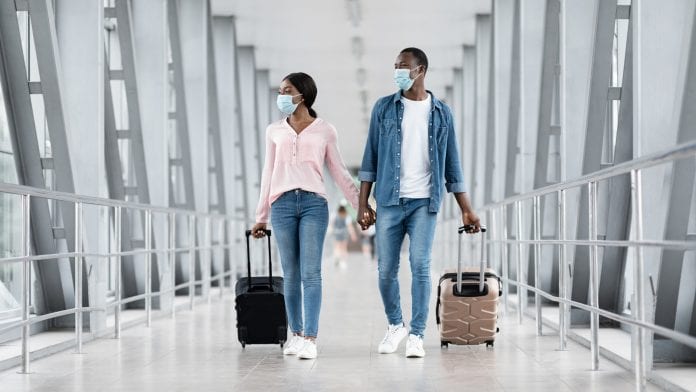
Nova Biologicals explores the risks of travelling abroad during the COVID-19 pandemic, including the best methods of travel, and the potential of not being able to return home.
With so many people being forced into isolation by the COVID-19 pandemic, the idea of going on vacation to get out of the house has become more and more appealing to many. While people were going on vacation before the pandemic started, the world is facing a much different situation than it has in the past.
As the coronavirus has spread worldwide, the idea of going out into the world and spending a week or two in places that are untouched by the problems being faced at home is one that cannot really exist in the current circumstances. Many countries have laws in place to heavily restrict the flow of tourists or travel in general, some even go so far as to ban travel all together, and as such, it is much more difficult to successfully escape the influence of the pandemic. Risks of COVID-19 exposure has led to places like France, India, Japan, and even New Zealand, which had previously been able to support claims of being virus-free, having to suspend travel once again to various degrees. In some instances, this ranges from simply cautioning against travel to outright barring tourism until normalcy can return.
Some businesses, such as amusement parks or tourism services, have made considerable efforts to remain open during this pandemic, but even these have been affected by the pandemic. For example, a day at Disneyworld today is much different from a day at Disneyworld two years ago. Effort has been made to encourage social distancing and improved sanitation, but this can only lessen the likelihood of contamination, not prevent it.
Between countries banning travel and common local vacation spots having to carefully manage the number of people which are allowed entrance, it may be a much more reasonable expectation to ignore the possibility of travel to a place untouched by the pandemic. However, halted vacation plans are among the least important problems being faced by society right now, as the state of the pandemic has gotten much worse in some countries.
Travel abroad
While places like the United States have been making considerable progress towards distributing local vaccines to their population, countries like India are currently in the grips of a dangerous resurgence in documented COVID-19 cases. Recently, the number of infections in India has surged to over 22 million and it only seems to be rising. According to the World Health Organization (WHO), there have been nearly 160,000,000 confirmed cases of infection and over 3,000,000 deaths throughout the world, and that is only counting what has been documented. It has gotten to the point that international travel during these circumstances has led to a lack of ability to return to one’s home country.
Passports, health screenings, and the circumstances surrounding travel from heavily infected countries have resulted in hundreds of thousands of people being barred from returning to their homes because the COVID-19 situation escalated in some way while they were gone. Though this may seem a simple issue to resolve, the possibility of these tourists returning from vacation carrying a different strain of the coronavirus and risking infection of others makes the situation more difficult to resolve.
Some have argued that since New Zealand was able to almost wipe out the virus completely early on in the pandemic, the danger of contamination must not be so grave. Although this may have been true early in the pandemic, there have since been several cases confirmed in New Zealand and travel to and from the country has been heavily limited. This also ignores the geographical situation that allowed New Zealand to maintain such a low infection rate, as being an island makes monitoring travel much more manageable than in countries with several neighbours, like India or the United States.
Even though it would be best to avoid travel as much as possible during this pandemic, expecting no one to try is unrealistic. This is especially true after several announcements and projected dates in regard to a possible end to the pandemic have come and gone as more strains have been discovered and populations have grown more frustrated with the current circumstances.
For this reason, it is important to provide some information about which methods of travel are better or worse during the pandemic.
The best methods of travel
To start, cruise ships should be avoided if possible. The close proximity, the frequent stops in which crew and guest both leave the boat, and the difficulty containing infection from people sharing rooms and utilities makes effectively preventing the virus from spreading through the population on the ship nearly impossible. Flying is not much better as it faces many of the same problems, but the shortened travel time when compared to a cruise ship, which often keeps hundreds or even thousands of people locked in close quarters for several days, makes it a much safer alternative.
Despite this, flying should also be avoided if possible, for the reasons mentioned above. Travelling by car is comparatively much safer than the other two options listed here, if only for the fact that most drivers would not be directly sharing a space with many other people at once. It may be expensive on gas prices to take an extended trip by car or truck, but it is undoubtedly easier to manage in terms of avoiding the coronavirus. That said, flights may require negative COVID-19 test results to be supplied to staff beforehand, and some places may ban tourists even if they go to the trouble of driving cross-country to get there. For this reason, understanding the current health situation of the destination needs to be one of the first things done in preparation for a vacation anywhere.
Although the coronavirus should be one of the main concerns when travelling, since having a vaccine does not make a person immune to infection or prevent them from transmitting the virus, there are still other threats that need to be considered. Other diseases still exist and can easily make one just as sick as COVID-19, and they are often no less transmissible. Reports of diseases such as Dengue, Ebola, and Polio are on the rise in various countries.
Natural disasters still occur regardless of what sanctions or travel bans are in place and can disrupt travel plans which could easily result in situations even worse than the pandemic. Something like a hurricane or earthquake could not only disrupt everyday life in an area, but also wreak millions of dollars in damages to structures and vehicles.
In April, the volcano La Soufrière, erupted in St. Vincent, making travel and the lives of those involved very difficult. After the volcanic eruption, over two thirds of the island were covered in ash and the local water and air quality diminished to dangerous levels. Undoubtably, these problems would affect tourists and travellers as much as they would anyone else in the area at the time. Combining these possibilities with the risk of being unable to return immediately, whether that be due to sudden disaster or travel ban, the danger invoked by travelling internationally is much greater than travelling cross country, though as mentioned earlier this is not guaranteed to be safe either.
Observing national health mandates and travel advisories can be beneficial, but there is no way to completely account and prepare for all the potential factors that may come into play while visiting other countries, especially while they are attempting to manage a pandemic.
The pandemic continues
The most important piece of information to keep in mind when considering thoughts of vacations or travel this summer is that the pandemic is not over yet. Some areas and cities may not be as affected as others, some may not be forced to observe the public health mandates regarding practices such as social distancing or wearing masks in public, and some insist that there is little to no real risk of contracting the virus at this point in time.
This is demonstrably untrue, and in many cases is more the result of people trying to pretend that circumstances are not as dire as they are. For many, external factors outside of COVID-19 itself have made finding ways to deal with travel much more difficult. Not only are natural disasters a constant possibility, hurricanes and volcanic eruptions do not wait for public health mandates to lift, and some areas are also being affected by an increase in terrorism at the same time. France, Israel, India, and the Gaza strip, for example, are also dealing with threats to their healthcare structures from terrorist organisations while also trying to navigate the pandemic, and that is not to mention the constant issues of funding, research, and resources faced by many countries due to this pandemic.
So, while it may first seem like a good idea to travel this summer to try and get away from the pandemic, please understand that the entire world is being affected. If getting out of the house is desirable, it may be best to instead consider local venues that are currently available. Even if it is not as enticing an idea, it does negate several of the problems faced by international travel, including the potential to become temporarily locked out of one’s own country. It has been a hard year since this pandemic began, and substantial progress has been made on both understanding and defeating this virus, but until reliable and accessible treatment has been made publicly available, it is not over – and caution should be exercised.
For more information on travel health, the COVID-19 pandemic, and the current state of global health, please visit the Centers for Disease Control and Prevention (CDC) website at https://www.cdc.gov/.
References
- https://wwwnc.cdc.gov/travel/notices/warning/volcano-st-vincent-grenadines
- https://www.cdc.gov/coronavirus/2019-ncov/travelers/faqs.html
- https://www.who.int/health-topics/travel-and-health/#tab=tab_1
- https://wwwnc.cdc.gov/travel/notices
- https://wwwnc.cdc.gov/travel/page/traveler-information-center

























